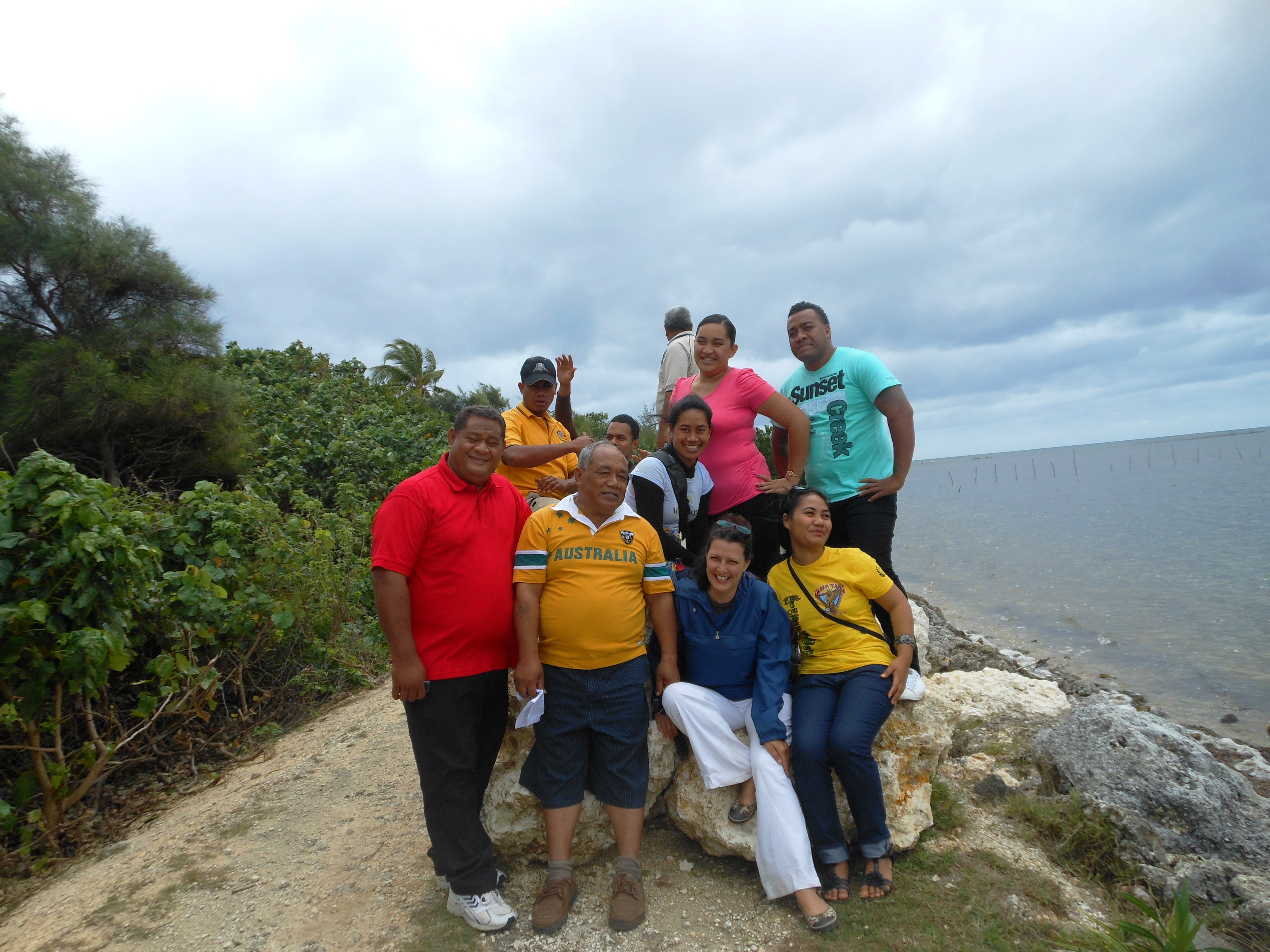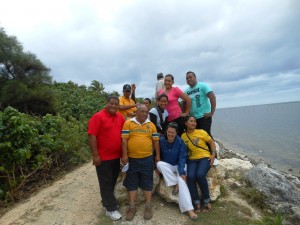
Natalie currently lives and works in China, but before that, she taught EFL (English as a Foreign Language) in Romania for three years with the Peace Corps before serving as a Peace Corps Response Volunteer in Tonga! Teaching English in various capacities across three foreign countries over five years is no small feat, so I asked her is she’d be willing to share her experiences so far. Happily, Natalie agreed! The interview below deals mostly with her experience as an EFL teacher in Romania.
Name: Natalie Montanaro
Place of Origin/Residence: Charleston, South Carolina, USA
Any contact info you wish to share (blog, facebook, twitter, email, etc):
www.linkedin.com/in/nataliemontanaro
http://www.acum.tv/articol/author/natalie-montanaro/
http://www.facebook.com/natalie.montanaro
http://myromanianholiday.blogspot.com
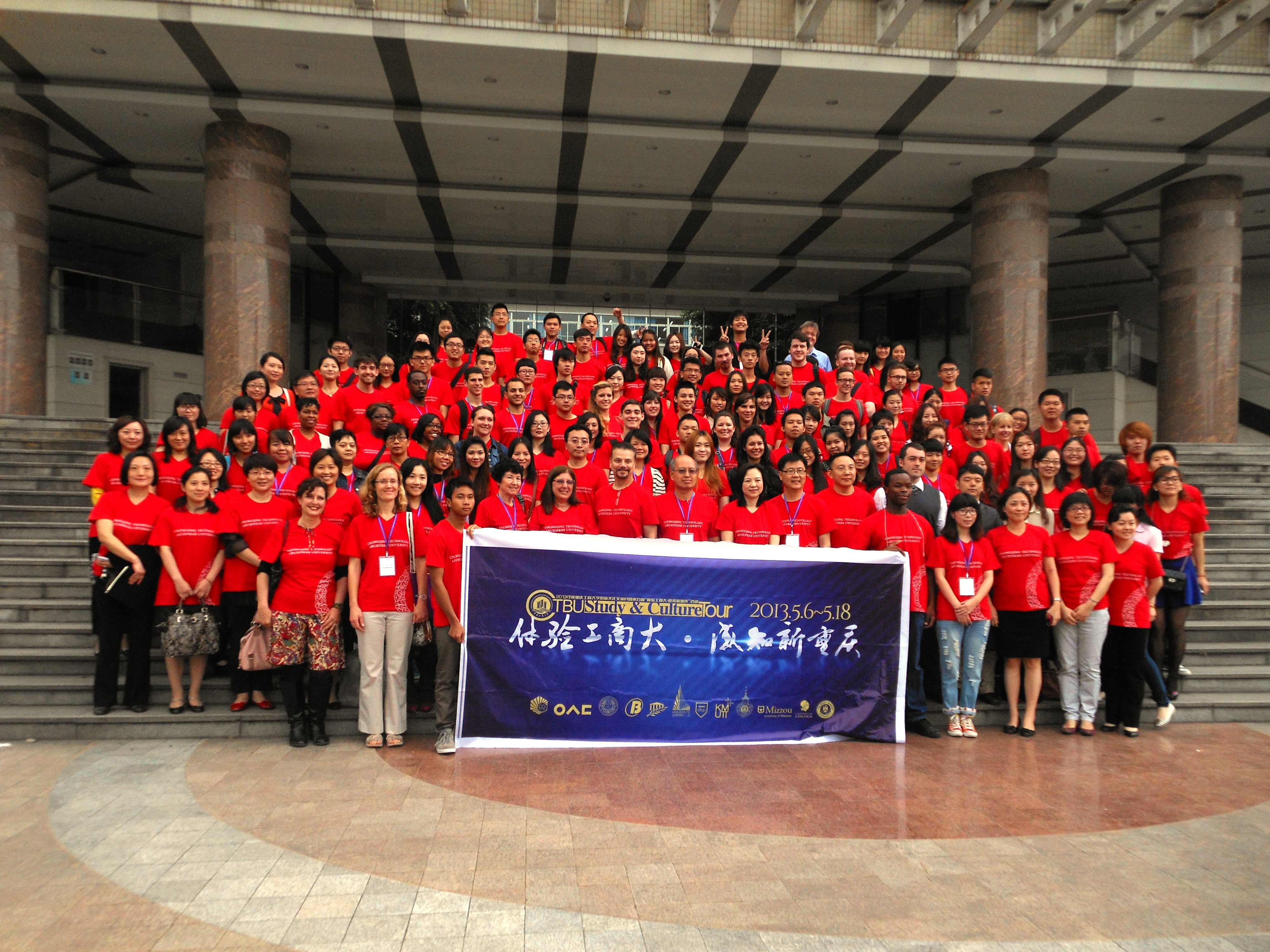
If you have completed your Peace Service, where are you located currently?
Chongqing Technology and Business University, Chongqing Municipality, People’s Republic of China
Where were you located while serving as a volunteer?
Romania Peace Corps and Kingdom of Tonga Peace Corps Response
Age during service: 52-55
Peace Corps Time-Frame:
Romania (TEFL Volunteer Extendee 2009-2012)
Kingdom of Tonga (Peace Corps Response Teacher Trainer 2012-2013)
What was your background (college, work, etc.,) before you joined the Peace Corps?
I earned a masters degree in foreign language education (M.Ed.) from the College of Charleston, Charleston, SC, with a concentration in ESOL and Latin after working for several years as a researcher, adjunct faculty member and School of Education program assistant. In these capacities, I wrote and revised grants, monitored applications for transfer and continuing education students, coordinated conferences and related materials for the department as well as prepared coursework manuals and supportive documentation for new teachers in the southeast. Other duties during my course of work in higher education included educational career counseling, transfer student information sessions and orientation presentations.

What was the process like when you joined?
As with many of us in the Peace Corps, the application process was fairly long-a full 17 months from the day I sent in the application online to the day I got on the plane to my new “home” in Romania. This is not unusual as medical checks, background checks, recommendation letters and the interview (mine was by telephone) are all a necessary part of the process.
I think that I needed to keep telling myself that it would happen eventually and I was confident that I’d be chosen for the perfect spot based upon my faith and the faith in the Peace Corps’ long-standing abilities. Waiting for word on the invitation was surely an anxious time. I’d been working all summer and no word came, then one day in November of 2008, I went to the Old Main Post Office to check on my mail during lunchtime and there was that big, beautiful blue packet from Washington, DC. I couldn’t open it fast enough. Then, practically running down the stairs, I literally yelled out to my friend on the street (and please don’t mind the cliché, but I really did say this) “I’m going to Disney World!”, as I’d read that I would be leaving on May 27th for Romania: a place I’d wished for since I’d studied so much about the country during my wait and also had a great affinity for the language as it is the closest spoken Romance language to Latin.
Were you placed in a location and/or field you had indicated an interest in? If not, what were you thoughts on that?
Yes, I was interested in facilitating the spread of international culture, language and research development in situations where host country partners needed it most. I’d been working with adults, but had had experience with grammar and middle school students in South Carolina during my graduate school training and therefore, it appealed to me to be able to live in a rural area, with little amenities, being the first American to meet the people in the village to which I was assigned.
Also, Romania had such a mystique for me, the “old world” culture, the farmlands, the animals, the traditions and its history-all of that played into the mental picture of what I’d hoped to experience as a Peace Corps volunteer my first time out.
Did you think you would enjoy it?
I knew right away that I would feel connected there as I’d prayed about it many times over, holding in my heart the promise that whatever I would face, it would be the opportunity of a lifetime to share with others whom I’d never known.

What was your assignment while there?
I was teaching English as a foreign language to students in grades 3-8 in three small schools in the communa of Brusturoasa.
http://edition.cnn.com/2010/TRAVEL/07/01/volunteering.rural.romania/index.html
Did you engage in a secondary project? If so, what?
During the three years plus I spent in Romania, I took on several additional projects. There were needs everywhere and so first, I began a bimonthly international cooking class for my young neighbors. Here is a sample of what we did:
http://wws.peacecorps.gov/wws/multimedia/slideshows/rmn_montanaro.cfm
After that, I also moved classes to wherever I traveled. I’d hosted cooking courses in my home and others all over Romania, then in each of 11 countries I visited all over Europe during my stay there, and finally in Tonga, where I was selected for Peace Corps Response in 2012. Now, I am a volunteer Food Revolution Ambassador for the Jamie Oliver Foundation and have held classes for students and colleagues here in China, also. Food Revolution Day is quite an event worldwide now and besides being featured on Jamie’s webpage at:
http://www.jamieoliver.com/us/foundation/jamies-food-revolution/news-content/teaching-a-love-of-real-food-around-the

There is a Facebook page just for our Tongan friends and others both young and old, novice and expert, to participate in sharing the love of real food that is good for you and made with locally available ingredients. See: http://www.facebook.com/FoodRevolutionKingdomofTonga
As a teacher, it’s so important to focus on practicality in learning and this is one way in which I’ve been able to contribute in a lasting and positive way both during my Peace Corps service and certainly continuing into the future.
Next, there was a year of children’s theater, where my students performed springtime and holiday stage productions of Alice in Wonderland and A Christmas Carol. It was a challenge to adapt the scripts to accommodate the littlest ones, along with translations of stage directions and roles which demanded much of children who were new English speakers and also new to the craft of acting rather than just reciting.

We covered set design, stage directions, makeup, costumes, typesetting the programs, marketing and even music and dancing. The choreography of original dance for me was a first, but when our piece “Will You Won’t You Join the Dance” was first performed to a packed crowd of parents and community, I was very pleased at the smiles and applause at the finale. My students had made me so proud.
There were also both required (IST, MST and COS) and optional conferences at which all of us in the Peace Corps participated which included guest seminars on behavior management, networking, technology, intercultural communication and other relevant subjects. In my second and third year, I accepted to more invitations to work with the Comenius and Grundtvig Projects by way of the European Union (EU).
First to Krakow, Poland and then to Panevėžys, Lithuania, along with a select group of school colleagues, we were asked to present in a forum our own new ideas and strategies for teaching in schools and communities where disadvantaged young people (such as the Roma and special education needs students) needed help to integrate, manage and flourish in their daily lives. It was an honor for me to be able to contribute with people from all over Europe whose fresh thoughts and skills in their own communities complemented ours across the miles.

In my final year of Romania Peace Corps, I developed a program merging tourism marketing and digital photography for secondary school students in the city of Cimpia Turzii called Through A Lens. The grant for 5200 Euro was awarded by Youth in Action Europe to provide Nikon cameras and teaching materials for an interested group of 12 high school students along with five of their teachers in order to pass on technique and interpersonal/professional skills while promoting tourism in their community
As a team, we created new postcards, a calendar, promotional posters and many online photojournalist pieces. We held an exhibition in the community center and in the county library where they were able to discuss their interest in photography and writing, display their work and have conversation with business leaders regarding future prospects.
Several of my students since completing the course are now working in professional situations in cities within the EU as well as locally, utilizing their newly refined skills in photography, English writing, web design, promotional materials and advertising. One is a wedding photographer and one has begin their own business in graphic presentation design. You can read more about the project here at:
http://www.realpress.ro/un-semnificativ-eveniment-s-a-desfasurat-la-campia-turzii-asociatia-parinti-pentru-copii%E2%80%99%E2%80%99-vine-cu-proiectul-%E2%80%9Cin-ochiul-lentilei%E2%80%9D

Were you posted in a remote or urban setting? Near other volunteers? What challenges or rewards have you experienced because of this?
I was first posted in a remote village of less than 3,000 people in the Trotus River valley of the Eastern Carpathian Mountains. There were few amenities, water by fontana (well) outdoors and a soba (wood stove) for heat.
We cooked mostly outdoors in the summer in a separate kitchen with portable gas cylinders and there were long treks on foot to my schools some days in snow, rain or mud (always there was mud!).
The views were tremendous, the lifestyle peaceful indoors while keeping me in shape outdoors, also getting close to the neighbors and my host family-whom I’d asked for to live throughout my tour of duty there-gave me a lot of insight into the culture both socially and with the family themselves.
Everything from fishing along the river, sledding down night paths on twinkling snow, milking cows and washing clothing by hand, selecting fresh, sweet pears off the trees, everything, is burned in my memory as the best time I could have ever had in the Peace Corps for my first tour.
What was the living condition for the people there?
The people lived on self-sustaining farms with little else but their own animals, a piece of land for gardening, older wooden structures or stucco overlay for housing, horse carts and severe winter weather. The springtime and fall seasons are both beautiful and hugely busy for everyone, keeping them up from dawn to dusk on chores like planting, sowing, feeding, gathering, weeding, canning for winter, cutting wood and herding the animals in at the end of the day, to name a few of the daily necessities of Romanian village life.
What was the greatest need, based on your observation?
Really, it was to instill a love of lifetime learning in students who didn’t believe that they could finish school and go to college someday. The hardships of many who either had sheep to care for or elder family were very daunting for them.
One boy said to me that he would “only be a shepherd” one day, foregoing high school. I then convinced him to reconsider that being a shepherd was a valuable occupation. One which would support his family and contribute to the community, provided he studied well, learned how to use technology to his advantage and present himself as a shrewd businessman who could not only garner stock at a reasonable price, but care for them knowing the right medicines and nutrition, along with learning and researching how to buy and sell wisely and market his products to others outside of the village.
I told him that it took skill and courage as well as education and that if he left without realizing his full potential, the future would be less than competitive for him. Eventually he agreed with me and now has finished high school and gone on to college in Cluj-Napoca to return with what I am sure will be a more confident and optimistic outlook.
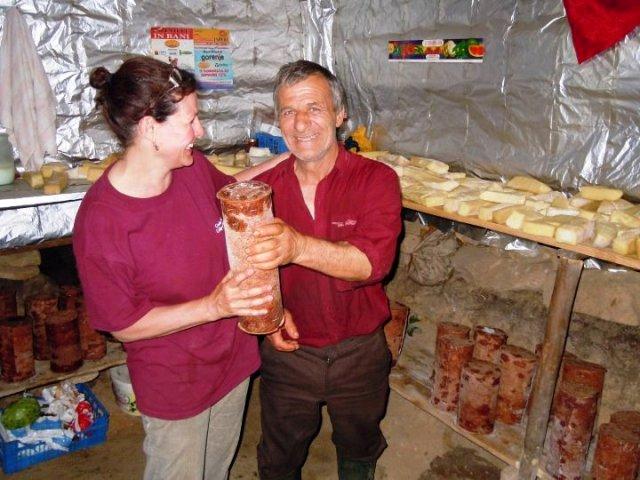
What did you observe about the culture there?
Most of the people in Romania as a whole were quite negative about their prospects having come recently out of communism. They would shy away from venturing out to other places, even in their own country in favor of a quieter, simpler way of life.
Many of the older people were well-worn due to years of hard work and few of the young people knew much about the world outside their own village. Some of the older villagers said they even preferred life under the old rule as it made things more secure for them, more predictable.
What I did see on a positive note was that the life in a small village brought them a kind of peace, a tighter family unit, a comfort that at the end of the day, was obviously needed by each of them. They have a huge respect for religion (something which I, too, share) and are able to recall stories and poems, play instruments and participate in folk dances which reach into your bones and thrill you under the stars by the light of the fire, even if they’ve worked all day to ends of their own limits.
Is there a particular experience that stands out in your mind related to your volunteer work at your post?
The times that I will remember the most are those where I was side-by-side with the people in their daily lives. Hiking up a mountain to the stana (shepherd’s hut) to learn how to make branza (cheese); getting all the preparations done for a funeral by setting out the candles and creating fruit-laden crosses and all the other ritual things needed for the grandfather’s passed on body laid out in the next room; roasting the lamb for Easter which we had purchased from a neighboring farm and slaughtered at home; dressing the children for their special holiday dances and commemorative days, helping locals with their English and computer skills after school; gardening and sharing the spoils; sitting together in the teacher’s room after a hard day and enjoying a bit of talk, coffee and snacks consisting of sausages, cheeses, olives, bread and vegetable spreads (such as salate de vinete and zacusca) together; going to the piata (market) to chat with friends while mulling over the price of cabbages or batteries; attending church services in solemn prayer—all of these times and more literally form the fabric of my own Peace Corps story.

What was your housing like? Did you live alone or with a family? What challenges and rewards have you experienced from this?
I had a comfortable room with my own bathroom, plenty of storage space and a nice connection with the family whose adjacent rooms also included a huge entry space with kitchen facilities so that I could teach international cooking to a crowd quite easily. It was absolutely rewarding in that my language skills and our relationships were much more pronounced and closer than I could have ever gotten living on my own there. The bit of privacy you sacrifice is nothing to the ways in which I was right inside of the center of gravity with my host family.
What did your diet typically consist of?
There were many seasonal fruits and vegetables and in winter, we ate all that had been preserved like pickled cabbage, cucumbers and peppers along with potatoes, apples and smoked pork which had been stored in the bec (root cellar)
What is/was a typical day for you?
Typical…hmmm…never. Each day was different in its own respect and there were many times that I felt I had no real routine. However, I did get a lot of conversations going, explored all that I could outdoors and learned as much as possible about being Romanian while I was there. Now, the same folks whom I lived with as a Peace Corps volunteer, are my lifelong friends. I’ve just visited many of them going across the country by train to reconnect with the people and children who will forever be a part of me.
What was the hardest thing about your PC experience?
The one hardest thing that I had to do was getting through the pain of the loss of my best friend, Jim, to fourth-stage lymphoma just two months into my service. That was a time where I needed to find strength not to fall apart and keep my head up along with my spirit for many days afterward.
What was the most rewarding thing?
Many times (walking to school together, seeing my students ask many questions, listening to Romanian ballads, helping with the chores, etc.) and every day were a great reward, but one stand-out memorable time that I will share is an early morning at the Camenca school where I visited the kindergarten class for a Valentine’s Day party-their first one. I brought homemade brownies, red and pink candies, balloons and made individual heart pins along with a CD of old Valentine’s Day tunes for dancing.
When the song “Let Me Call You Sweetheart” came on we were all in a ring holding hands and the tiniest guy in class (1/3 smaller than anyone!) looked up at me with the biggest smile and a set of teeny kid-teeth full of brownie cake crumbs. I couldn’t help but smile back both inside and out since he was the best date I’d ever had! It was so precious that it truly almost made me cry.
What was the area like when you first arrived? Have you noticed any changes since that time?
One of the most prominent things that I notice now is the deforestation going on in all parts. The flood which displaced many of us in June of 2010, (Peace Corps had to find me new housing also) was caused by this phenomenon that is all too dangerous in the mountain villages where people rely on wood for heat, cooking, construction, transport with horses and fencing around their properties.
What were your hobbies or activities you engaged in during your free time?
I did a lot of writing, submitting regular articles for a Romanian newspaper as their English language columnist. ACUM online gave me the opportunity to share what I’d seen and done with those who wouldn’t normally read the other publications which I also contributed to (Charleston Post and Courier, Third Goal.org, Peace Corps.gov, CNN, Worldview and NPCA).
I found time to paint with watercolor, took long walks, had my camera with me always and watched movies at night or read books (I think I now faithfully read about three a week) when it was too late to go out in winter or sat with neighbors enjoying time playing cards or having meals together practicing the language. The kids also loved to come by and bake cookies, play Scrabble or just have fun going out on exploratory missions to collect flowers for tea, old bones from lost animals carcasses or try to snag a trout or two on our river with sticks and string.

Where was your favorite place to go?
I think that I loved most walking in the woods when the snow was just coming down under a large moon and feeling how warm it was. We were right under the mountain and sledding was fast and furious as the light twinkled on over the forest.
What other places did you visit while there? What were your favorites?
I went to over 65 cities and towns while there and my favorites were the historic/castle towns such as Brasov, Sibiu, Sighisoara and Sinaia. You can see many of these wonderful places documented on CNN iReport at RomaniaScene or in my Facebook photo albums.
If visitors came to your location, what highlights would you recommend?
If someone wishes to visit Romania, I’d say, bring a lot of openness to accept the people as they are. They will try to fill you to the brim with food and drink, but also will welcome you with open arms. They are a kind and loving people, with a long history of oppression. Many are very poor, but they are rich in so many other ways.
Go to the smaller villages, get to the Hungarian-populated parts, too, where you will enjoy different songs, stories, foods, and a language which is both unique and complex, also.
See the great cities I’d mentioned before, be sure to also see the college-towns like Cluj-Napoca as well as the urban centers like Bucharest where their revolutionary history is showcased. Don’t miss out on the wonderful nature in the Fagaras Mountains or the shimmer of Red Lake. But most of all, take the train to see the wonderful countryside and be with the people who make up the life of this country.

Did you have difficulty re-adjusting to life after the Peace Corps?
I was able to take a position in Tonga as a teacher trainer for Peace Corps Response, developing lessons and materials for primary and secondary school teachers across the kingdom to become better equipped at their jobs. In addition, it afforded me the opportunity to meet more Peace Corps family, work in a different facet of the organization, and experience the wonderful places, sights, sounds, tastes, blue sky and friendships of the kingdom which you yourself write about.
http://blogs.cofc.edu/gradschool/2013/10/08/second-nature-by-natalie-montanaro/#
It was a very special time and going from one continent to another without a break didn’t even give me a moment to stop as I got right into my new volunteer position there, so actually, I never had that “transition” until I got to China.
Now, I am a “foreign expert teacher” for the Finance School of a business and technology university here in Chongqing and this has been my turn back into life post-Peace Corps. In some ways, it is like the Peace Corps experience in that it is a new culture, foreign language, different customs, far away and far removed from my life in Charleston, South Carolina. But in other ways, it is the same in that I never feel I am not “Peace Corps”.
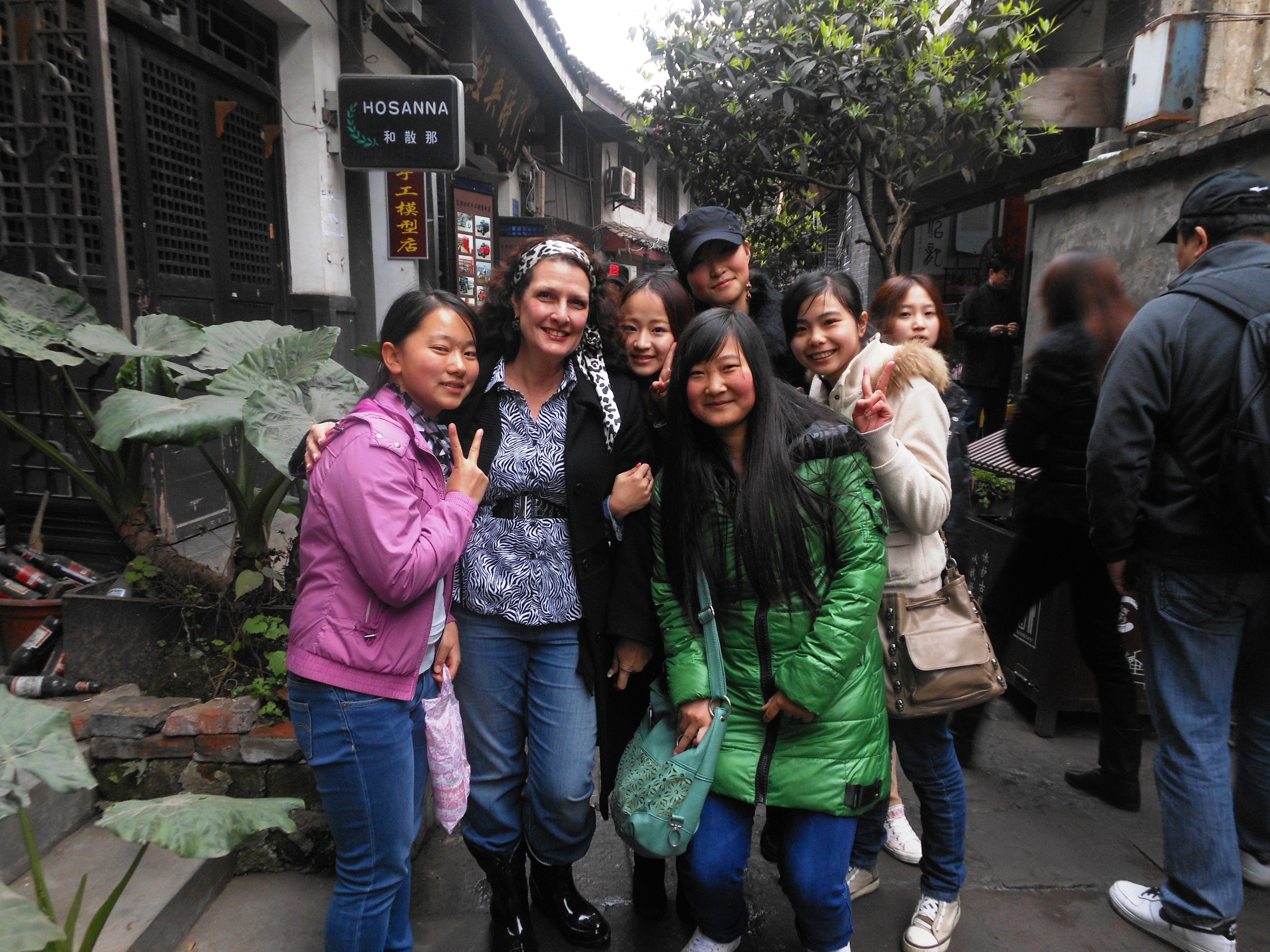
The ideals and the purpose of our going into service are the same ideals and purpose I feel here as a paid employee in the most populated country on earth. It never leaves you-that sense of wanting to provide your best while soaking up what is the best along with managing the worst of living away from home day-to-day, week-to-week, month-to-month and year to year.
Since coming here, I’ve thought a lot about how to go forward and surely, Peace Corps volunteering will be in my future again. For now though, I will continue to work abroad in education, learning and doing things which give others the chance to see that we are all more alike than different.

Overall, how would you summarize your Peace Corps experience?
I want to say that being a returned Peace Corps volunteer in many capacities in two different regions of the world has given me a perspective that is unique to anything I would have had otherwise. The people and the places are in the hundreds now, by they each hold a special place in my memory.
Romania was my first major service and will always be the “Peace Corps Life” that I will tell to others as it truly became a part of me. Where Romania was the substance, Tonga was the glue and during my time in the country, I had a chance to dedicate all that I’d learned in my first tour while in Eastern Europe to the teacher candidates under certification who so desperately needed guidance in their classrooms. They were able to learn from my professional and cultural experiences, and utilize methods and research which I’d studied and practiced from the US to the South Pacific.
There were countless opportunities to give back both in Romania and Tonga. During all of my service time I gained knowledge and friendships which I’d never expected back in 2009 by spending most of my free time with host country nationals. I also know that I no longer feel as if my world is only on one continent or another. It is the journey after all that counts and God willing, I will have many more years to do that both in and out of the Peace Corps. Thanks to my students, neighbors, family, friends and host country partners, the story is rich, unforgettable and truly a tale whose end is not yet written.
Notice: All photographs in this post are the property of: Natalie Montanaro Copyright 2013, and may not be duplicated, copied or otherwise used without her express permission.


